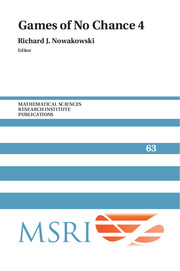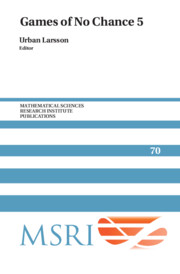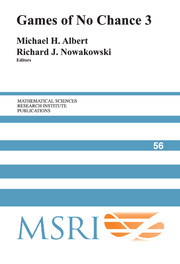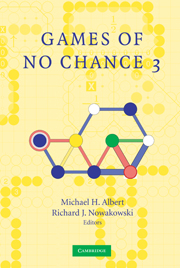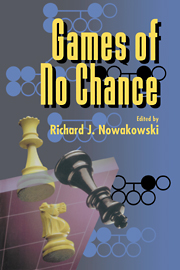Games of No Chance 4
Combinatorial games are the strategy games that people like to play, for example chess, Hex, and Go. They differ from economic games in that there are two players who play alternately with no hidden cards and no dice. These games have a mathematical structure that allows players to analyse them in the abstract. Games of No Chance 4 contains the first comprehensive explorations of misère (last player to move loses) games, extends the theory for some classes of normal-play (last player to move wins) games and extends the analysis for some specific games. It includes a tutorial for the very successful approach to analysing misère impartial games and the first attempt at using it for misère partisan games. Hex and Go are featured, as well as new games: Toppling Dominoes and Maze. Updated versions of Unsolved Problems in Combinatorial Game Theory and the Combinatorial Games Bibliography complete the volume.
- Includes a tutorial for the misère quotient approach to misère impartial games
- Introduces a misère quotient approach for misère partizan games
- Features new techniques used for analysing games
Product details
April 2015Hardback
9781107011038
350 pages
234 × 156 × 21 mm
0.6kg
70 b/w illus. 23 tables
Available
Table of Contents
- 1. Peeking at partizan misère quotients Meghan R. Allen
- 2. A survey about solitaire clobber Laurent Beaudou, Eric Duchene and Sylvain Gravier
- 3. Monte-Carlo approximation of temperature Tristan Cazenave
- 4. Retrograde analysis of woodpush Tristan Cazenave and Richard J. Nowakowski
- 5. Narrow misère dots-and-boxes Sebastien Collette, Erik D. Demaine, Martin L. Demaine and Stefan Langerman
- 6. Toppling conjectures Alex Fink, Richard J. Nowakowski, Aaron Siegel and David Wolfe
- 7. Harnessing the unwieldy MEX function Aviezri Fraenkel and Udi Peled
- 8. The rat game and the mouse game Aviezri Fraenkel
- 9. A ruler regularity in hexadecimal games J. P. Grossman and Richard J. Nowakowski
- 10. A handicap strategy for hex Philip Henderson and Ryan Hayward
- 11. Restrictions of m-wythoff nim and p-complementary Beatty sequences Urban Larsson
- 12. Computer analysis of sprouts with nimbers Julien Lemoine and Simon Viennot
- 13. Navigating the MAZE Neil McKay, Richard J. Nowakowski and Angela Siegel
- 14. Evaluating territories of Go positions with capturing races Teigo Nakamura
- 15. Artificial intelligence for bidding Hex Sam Payne and Elina Robeva
- 16. Nimbers in partizan games Carlos Pereira Dos Santos and Jorge Nuno Silva
- 17. Misère canonical forms of partizan games Aaron Siegel
- 18. The structure and classification of misère quotients Aaron Siegel
- 19. An algorithm for computing indistinguishability quotients in misére impartial combinatorial games Mike Weimerskirch
- 20. Unsolved problems in combinatorial games Richard J. Nowakowski
- 21. Combinatorial games: selected short bibliography with a succinct gourmet introduction Aviezri Fraenkel and Richard J. Nowakowski.

